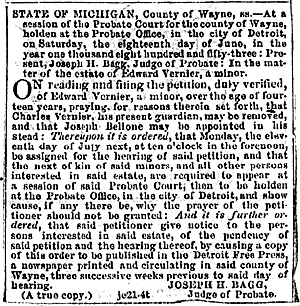A Michigander tale
There are simply no records available anywhere that tell the stories that probate records do.
These are, as the name of The Legal Genealogist‘s class for Ancestry Academy points out, The Records of Death. They report and document the deaths of many of those who came before us.
But they also document so very much of the lives of the survivors.
And they tell such stories.
Like the one I came across from Wayne County, Michigan, just yesterday.
A story of brothers that didn’t quite get along… and a teenager who wanted things more his own way.
 Imagine, if you will, the situation of Edward Vernier dit Laducere, 16 years old, and an orphan.
Imagine, if you will, the situation of Edward Vernier dit Laducere, 16 years old, and an orphan.
His father, Charles, died sometime before 1850. His mother, Marie, died about the first of July 1850.
He was the youngest of four brothers, with Charles, Daniel and John Baptise being older than he was. Charles was the only one of age in 1850, so he was named as the guardian of his younger brothers.
The year at the time of this court record was 1853, Edward was living in Wayne County, Michigan, with his guardian and older brother Charles. Charles, at the time, was the grand old age of 24. And, according to Edward, he was bossing Edward around.
And, it almost goes without saying, Edward didn’t like it one bit.
So he wanted somebody else as his guardian, instead.
So in July 1853, he asked the court to replace Charles.1
Now because Edward was over the age of 14 in 1853, he was entitled to choose his own guardian, but the court wasn’t simply going to remove Charles without hearing Charles’ side of the story. It required notice — to Charles and to “persons interested in (the) estate” — that Edward wanted Charles removed and Joseph Bellone appointed instead.2
In March of 1854, the probate court there in Detroit heard the case. And here’s the story Edward told the court, through an interpreter because his native language was French:
He (Charles) made him work very hard … at braiding straw hats. … He used him very hard when he was sick. … He laid out work and ordered him to do it. And whipped him once. Witness is 16 years 30 July instant. Was not 14 when he went to live with Charles. He has always been ailing. Has had a sore leg. Charles took no care of him, brought him to town to a Dr. once, and then sent him to work. … The general treatment has been … hard when sick and made him work too hard. … He told Charles he was not satisfied with his living. Charles said he might go, that he thought he would be no better satisfied than he was there and that the same treatment would be given him. Never gave him any money of his Estate. He went to a public school. … All he has ever had is his board. Charles never paid him for any work. Thinks he has worked enough for his board … Raking hay & loading hay … He (Charles) never treated him kindly … (but) harder than he did his own child. … He never asked Charles for money. … He did not complaint to Charles about working too hard…3
There are statements by various others in the records that follow — including Charles’ own statement that Edward didn’t work enough to pay for his board, that he’d absorbed the costs for eight months that Edward lived with him and “made him a present” of that.4
Daniel and John submitted statements as well, with Daniel saying he didn’t think Edward had earned enough to pay for the whole costs of living with Charles5 and John saying Edward probably earned enough during the harvest season but not during the winter.6
Now the personal story by itself is worth the effort of tracking down these records. I mean, seriously, doesn’t this whole thing strike you as about the kind of story you’d hear from (and about) almost any teenager, at almost any time? And wouldn’t this detail be a joy to include in a family history?
But of course there is more in the file.
We learn about work in the area braiding straw hats, and chores like picking apples and milking the cow, raking hay and picking corn.
We find a map with the land of the deceased Vernier father and how it will be partitioned among the sons. We see what the taxes were on the property.
We learn what legal fees were like at the time — Charles paid his lawyer $5.00 in legal fees for representing him in the dispute. Which, by the way, ended with a new guardian, but no other repercussions for Charles.
And there is so much more.
Battling brothers. Local conditions. The value — and annoyances — of work.
Oh, yes, the stories that probate records tell.
SOURCES
- Wayne County, Michigan, Probate Court, Probate Packet No. 1713, Estate of Vernier, verified statement of Edward Vernier, July 1853; digital images, “Michigan, Wills and Probate Records, 1784-1980,” Ancestry.com (http://www.ancestry.com : accessed 21 Sep 2015). ↩
- Ibid., Printer’s Bill, Detroit Free Press. ↩
- Ibid., statement of Edward Vernier, March 1854. ↩
- Ibid., statement of Charles Vernier, March 1854. ↩
- Ibid., statement of Daniel Vernier, March 1854. ↩
- Ibid., statement of John Vernier, March 1854. ↩



Oh I love this post. Probates truly do reveal things we couldn’t find any other way and this one is priceless. I always smile to think how they had no idea that years down the road their descendants and others would be reading the stuff they said. At least they didn’t have to worry about Facebook.
>> At least they didn’t have to worry about Facebook. << Ain't that the truth…